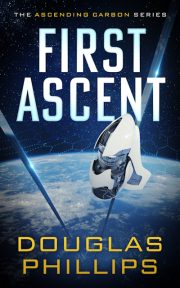Legal Affairs Committee
Today, the Legal Affairs Committee monitors court cases, regulatory action, proposed legislation, and requests for comments on issues that could affect speculative fiction writers per United States of America law. It reviews and helps draft legal amicus curiae briefs. The Committee also makes recommendations to the Board, such as advising SFWA to use the Legal Fund to assist writers in defending their copyrights and fighting efforts to trademark general terms that are used by many writers.
The Legal Affairs Committee is the successor to two older committees, the Orphan Works Committee and the Copyright Committee. The Orphan Rights Committee worked from 2005 to 2013, posting comments to the Copyright Office on orphan works and related issues. The Copyright Committee responded to requests from the United States House Judiciary Committee for comments on changes needed to copyright law.
Please direct any questions or issues to LegalAffairs@sfwa.org.
In Memoriam
James W. Fiscus
1944-2021
Co-Chair SFWA Legal Affairs Committee
Legal Affairs Comments, Actions, and Papers
Comments Requested by the Librarian of Congress
January 2017: The Librarian of Congress requested comments of the duties of the Register of Copyrights, and SFWA submitted comments. PDF
January 2017: SFWA responded to a Web survey from the Librarian of Congress regarding the Register of Copyrights. PDF
Comments Requested by the U.S. Copyright Office
AI Initiative
October 2023: The SFWA Board and the SFWA Legal Affairs Committee Comments to the US Copyright Office in response to their August 2023 Notice of Inquiry regarding copyright law and policy issues in artificial intelligence, which is part of their Copyright and AI Initiative. PDF
Group Registration of Works
The SFWA Legal Affairs Committee has responded to a number of calls for comments regarding how to best allow creators to register a group of works with a single application for U.S. Copyright. These efforts contributed to the addition of a shorts works registration rule at the U.S. Copyright Office.
January 2017: SFWA Joint Comments on Group Registration of Contributions to Periodicals. Comments signed by National Writers Union, American Society of Journalists and Authors, SFWA, and Horror Writers Association. PDF
January 2017: SFWA Joint Comments on Group Registration for Unpublished Works. PDF
December 2018: SFWA Comments Concerning Group Registration of Short Online Literary Works. PDF
March 2020: SFWA Comments on Registration of Online Publication. PDF
Moral Rights
March 2017: SFWA and the National Writers Union Comment on moral rights in publishing contracts. PDF
Comments on CASE Act Regulations (Copyright Small Claims Court)
The CASE Act (Copyright Alternative in Small-Claims Enforcement Act) was passed by Congress and signed by the President in December 2020. The intent of supporters of the Act was to have a small claims court that could handle copyright cases faster and cheaper than cases before the regular federal courts. The SFWA Legal Affairs Committee responded to calls for comments on proposed rulemaking by the Copyright Office.
April 2021: SFWA Comments on the CASE Act Regulations, Round One. PDF
April–May 2021: SFWA Comments on the CASE Act Regulations, Reply Comments. PDF
May 2021: SFWA Comments on the CASE Act Expedited Registration and the Freedom of Information Act (FOIA). PDF
September 2021: SFWA Comments Concerning Proposed CASE Act Regulations: Small Claims Procedures for Library and Archives Opt-Outs and Class Actions. PDF
October 2021: Copyright Claims Board: Initiation of Proceedings and Related Procedures. PDF
Comments and Testimony to Congress
The Legal Affairs Committee has responded to requests from members of Congress several times, including formal comments to the House Judiciary Committee. We anticipate more efforts to directly influence national legislation.
July 2013: Comments Submitted by SFWA to the House Judiciary Committee. Committee Chair Bob Goodlatte and Ranking Member John Conyers, Jr. requested testimony on reform of Copyright, and SFWA presented suggestions.
January 2017: Following possible copyright reform by the House Judiciary Committee, SFWA submitted the following comments to the House Judiciary Committee. The process stalled when both the Chair and Ranking Member left the House soon after the comments were submitted. PDF
March 2021: SFWA responded to a request for comments from Senators Thom Tillis and Patrick Leahy on their proposed Digital Copyright Act of 2021. PDF
Amicus Briefs and Other Legal Actions
The Legal Affairs Committee has reviewed a number of amicus curiae briefs prepared by other writers organizations, suggested changes, and recommended to the Board whether SFWA should sign on to the amicus briefs. The Committee anticipates that in the future SFWA will prepare amicus curiae briefs itself.
Georgia State University
In 2008, a number of publishers sued Georgia State University, alleging that teachers at the university were violating Cambridge University Press’s and other publishers’ copyrights by distributing chapters from scholarly books to their students. The Authors Guild’s lawyers wrote an amicus brief supporting the publishers’ position that was signed onto by many creators’ groups, including SFWA. After many appeals, in 2020 a district court in Georgia decided that 37 of the 48 infringement claims at issue in the case were fair use.
December 2016: Signed amicus brief. PDF
Fourth Estate Public Benefit Corp. v. Wall-Street.com, US Supreme Court
Fourth Estate, a cooperative public benefit cooperation, produced articles for other organizations. Wall-Street.com cancelled their licensing agreement with Fourth Estate, which required Wall-Street.com to remove Fourth Estate’s content from their site. They refused to do so and Fourth Estate sued for copyright infringement, after having submitted their application for registration but without having waited for the registration to be approved. The Writers Guild filed an amicus brief with the Supreme Court in support of Fourth Estate. SFWA and eleven other artists organizations signed on to the brief. The Court ruled unanimously against Fourth Estate that a copyright infringement suit must wait until the copyright has been registered by the Copyright Office.
September 2018: Amicus brief filing. PDF
April 2019: Letter to Registrar of Copyright. PDF
Google LLC v. Oracle America, Inc.
Oracle sued Google claiming that Google had infringed its copyright of Java in Google’s Android operating systems when it used some of Java’s application programming interfaces (APIs.) Oracle argued that APIs could be copyrighted and sought US$8.8 billion in damages. Two trial juries found for Google, but were reversed by the court of appeals for the Federal Circuit, which said that APIs are copyrightable, and that Google’s use does not fall under fair use. In February 2020 the Authors Guild and ten creators organizatons, including SFWA, submitted an amicus brief in support of Oracle.
In April 2021, the Supreme Court ruled in 6–2 that Google’s use of the Java APIs was within the four factors of fair use, bypassing the question on the copyrightability of the APIs. The case was remanded for further review.
February 2020: Amicus brief in support of Oracle. PDF
Excessive Trademark Practices
Problems with trademark are one of the newer issues the Committee has dealt with. In recent years, some writers have attempted to trademark common words and phrases used in series titles in such a way as to stop other writers from using the terms. The fight against excessive use of trademarks will likely be long.
Tamer
SFWA, the Authors Guild, and Romance Writers of America helped fund SFWA member Tom Tessier’s defense against a frivolous trademark infringement claim filed by Michael Scott Earle for using the word tamer in the title of Tessier’s Monster Tamer series of books. Series titles, as opposed to book titles, can be trademarked under some circumstances, as long as the terms are not generic and are capable of specifying a specific brand. In this case, there were many flaws in Mr. Earle’s trademark suit, which was similar in many ways to the cockygate trademark lawsuit in 2018. Eleanor Lackman from Mitchell Silberg and Knupp LLP represented Tessier with co-counsel in Texas, where the suit was filed. The parties settled amicably on February 26, 2020. PDF
Unfortunately, the approval of trademarking tamer by the US Trademark Office showed that it still doesn’t understand that series titles trademarks require careful oversight and should be issued rarely, for the same reasons that titles cannot be trademarked.
Quantum Series
SFWA funded an opposition to the trademark of Quantum Series for a series of books. Before a judgment by the Appeal Board, the parties reached a settlement stating that the trademark would only apply to the full term Quantum Series, and only in the romance genre, and not to other uses of Quantum in a title.
September 2018: An article by Douglas Phillips for the SFWA Blog explained the issues. PDF
January 2018: SFWA’s filing of a Notice of Opposition to the granting of a trademark on Quantum Series with the U.S. Patent and Trademark Office’s Trademark Trial and Appeal Board. PDF
October 2018: The Settlement of Case by Parties. PDF
Orphan Works
The issue of how the Copyright Office should deal with orphan works is critical for writers and has lead to extensive comments from SFWA. An orphan work is a work that is protected by copyright but whose copyright owner cannot be readily identified or located. The debate over them has ranged from believing such works should be freely used with little effort to find the rights holder to arguing that use of the works can only be take place after a diligent search for the rights holder. SFWA takes the latter stance, and this is a record of the former committee’s remarks on the topic and the Legal Affairs Committee’s more current work in this area.
March 2005: SFWA Comments on Orphan Works. PDF
February 2013: SFWA Comments on Orphan Works. PDF
March 2013: SFWA Reply Comments on Orphan Works. PDF
May 2013: SFWA Reply Comments for Orphan Works Round Table. PDF
September 2020: SFWA responded to a survey from the European Union on Orphan Works. PDF
The Google Books Settlement
In 2002, Google launched its Google Book Search program, scanning thousands of books, many of them still in copyright, and allowing large sections to be viewed online. The Authors Guild and Association of American Publishers sued them for copyright infringement. Before trial, the parties created a settlement that would allow Google to publish full copies of its scanned books and sell them individually and as collections. The SFWA Blog carried a number of articles detailing the history of the issues involved.
When the details of the settlement became known, many problems with it were raised, not least of which was that it would be an opt-out, not opt-in, solution. In addition, Google had negotiated their end of the deal to avoid any liability and place all costs on a newly created entity called the Book Rights Registry, which would collect revenues from Google and dispense them to the rights holders. Finally, publishers would take a share of the income from digital republication, even if they didn’t possess digital rights to the work. SFWA, the National Writers Union, and the American Society of Journalists and Authors came together and filed the following brief with the court in December 2012. Ultimately, the settlement was rejected by the court and Google prevailed, with the caveat that it would only publish “snippets.”
While the Google Book Settlement happened before the formal establishment of the Legal Affairs Committee, founding members of the Committee were involved with it, and SFWA’s letter illustrates our longterm interest in legal issues.
August 2009: PDF
December 2012: Brief filed by SFWA and other author organizations. PDF
Legal Affairs Committee Alerts
January 2018: Alert Regarding Copyright Infringement by the Internet Archive. PDF
August 2019: Personally Identifying Information on Copyright Registration: PDF
April 2020: Infringement Alert – “National Emergency Library”. PDF
January 2021: The CASE Act Becomes Law: PDF
November 2021: Legal Affairs Alert on the New Zealand National Library: PDF


